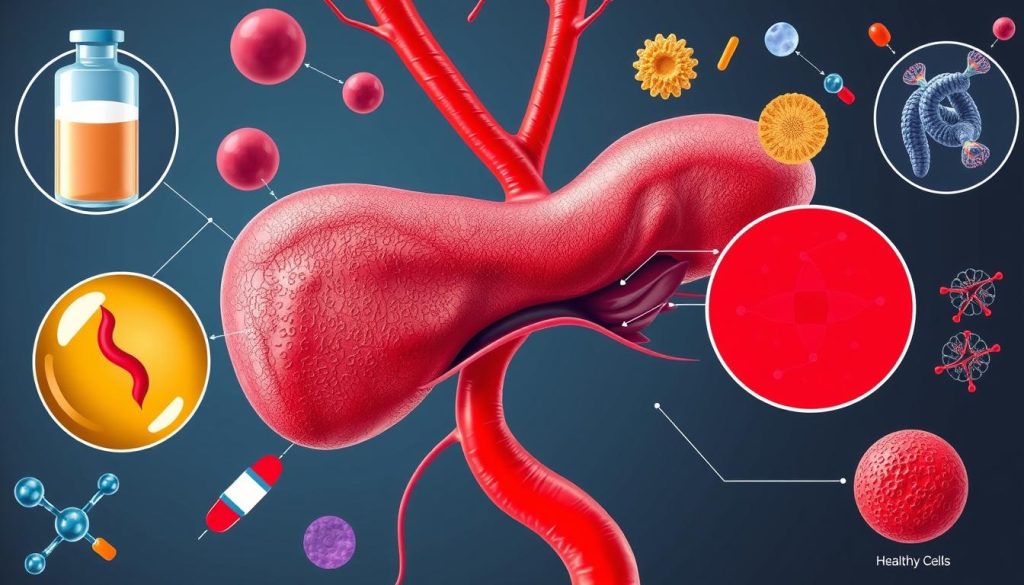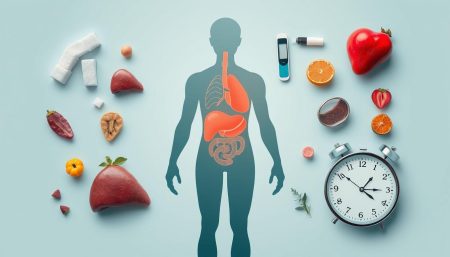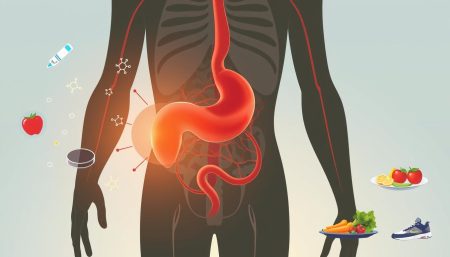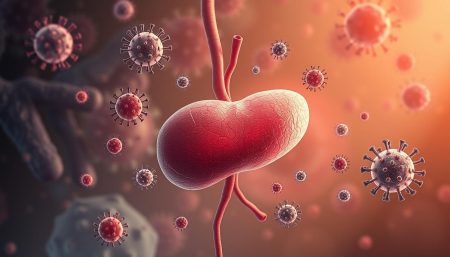Type 3c Diabetes Mellitus (type 3c DM) is often overlooked compared to other types of diabetes. It is also known as pancreatic diabetes or pancreatogenic diabetes. This condition mainly occurs after pancreatic disease and is different from Type 1 and Type 2 diabetes. It’s important to understand type 3c DM to manage it effectively.
As more doctors learn about type 3c DM, it’s key to teach and study it well. Recognizing it as a unique condition means we need special ways to diagnose, treat, and maybe even prevent it. Let’s explore how pancreatic diabetes affects people and what we can do to help.
What Is Type 3c Diabetes Mellitus?
Type 3c Diabetes Mellitus is a type of diabetes linked to secondary diabetes. It’s common in people with pancreatic disease. Unlike Type 1 and Type 2 diabetes, Type 3c DM comes from pancreatic disease. This disease affects both the pancreas’s exocrine and endocrine functions.
Defining Type 3c DM in the Spectrum of Diabetes
Type 3c Diabetes Mellitus, or pancreatogenic diabetes, is caused by pancreatic issues. These include chronic pancreatitis, pancreatic surgery, or cystic fibrosis. These problems harm the pancreas’s ability to make insulin and control blood sugar.
Characteristics of Type 3c Diabetes Mellitus
This diabetes type has a mix of insulin issues and fat digestion problems. People with it often have uneven blood sugar, weight loss, and nutritional issues. This shows the need for a detailed management plan.
Differences Between Type 1, Type 2, and Type 3c Diabetes
Knowing the differences between diabetes types is key for right diagnosis and treatment. Here are the main differences:
| Type 1 Diabetes | Type 2 Diabetes | Type 3c Diabetes |
|---|---|---|
| Autoimmune destruction of insulin-producing cells. | Insulin resistance and eventual insulin production decline. | Damage to pancreatic tissue leading to deficient insulin and digestive enzymes. |
| Common in children and young adults. | Most prevalent in adults, linked to obesity and sedentary lifestyle. | Often follows pancreatic disease or damage in any age group. |
| Requires insulin therapy for management. | Managed initially through lifestyle changes and medications; may require insulin. | Treatment focuses on both insulin use and enzyme replacement therapy. |
Causes and Risk Factors of Type 3c Diabetes
Type 3c Diabetes Mellitus, also known as pancreaticogenic diabetes, happens when the pancreas’s exocrine function is damaged. This section looks at the main causes like exocrine pancreatic insufficiency and chronic pancreatitis. It explains how these issues lead to this specific type of diabetes.
Exocrine Pancreatic Insufficiency and Type 3c DM
Exocrine pancreatic insufficiency (EPI) is a big risk for Type 3c Diabetes Mellitus. EPI happens when the pancreas can’t make enough digestive enzymes. This makes it hard for the body to absorb nutrients, which affects the pancreas’s health.
Without the right nutrients, the pancreas’s beta cells can get damaged. This damage can cause pancreaticogenic diabetes.
Chronic Pancreatitis Leading to Type 3c Diabetes Mellitus
Chronic pancreatitis is another main cause of Type 3c Diabetes Mellitus. It’s a long-term inflammation of the pancreas that damages the tissue. As it gets worse, scar tissue takes over, hurting both exocrine and endocrine functions.
This scarring makes it hard for the pancreas to make insulin and other important hormones. This leads to pancreatic diabetes.
Knowing about these conditions helps in catching Type 3c Diabetes Mellitus early. This can make managing the disease easier and reduce its effects.
Diagnosing Type 3c Diabetes Mellitus
Getting a correct diagnosis for Type 3c DM is key, but it’s often tricky. It’s important to know the specific challenges and tests for Type 3c DM. This helps in managing and treating the condition properly.
Troubles with Misdiagnosis
Diabetes is often misdiagnosed, mainly because symptoms of Type 3c DM can look like those of Type 1 and Type 2. This can lead to the wrong treatment and make the pancreatic problem worse.
Medical Tests Specific to Type 3c DM
To accurately diagnose Type 3c DM, certain medical tests are used. These include:
- Fecal elastase test, to check exocrine pancreatic function
- CT scan or MRI of the abdomen to see pancreatic issues
- Blood tests to measure enzyme levels and check pancreatic function
These tests are vital in telling Type 3c DM apart from other diabetes types. They help doctors create the right treatment plan.
Treatment Options for Type 3c DM
Managing Type 3c Diabetes Mellitus (DM) involves several type 3c diabetes mellitus treatment methods. These are customized based on the individual’s pancreatic function and health issues. This section will cover the different treatments, including medicines, secondary diabetes interventions, lifestyle changes, and surgery options. These are designed to help manage this complex condition well.
Medicines are often the first step in treating type 3c diabetes mellitus. Doctors may prescribe pancreatic enzyme replacement therapy (PERT) and insulin. This is because Type 3c DM affects how the pancreas works. It’s important to manage insulin carefully to avoid low blood sugar, as enzyme issues can affect how nutrients are absorbed and used.
Type 3c diabetes mellitus treatment also includes secondary diabetes interventions. These include changing diets to handle malabsorption and making lifestyle changes to ease the pancreas’s workload. It’s key to keep a close eye on glucose levels and make adjustments as needed, as the pancreas’s condition can greatly affect blood sugar and stability.
- Regular glucose monitoring to adapt treatment plans promptly.
- Dietary recommendations tailored to individual nutritional needs.
- Physical activity to enhance insulin sensitivity.
In severe cases, surgery might be considered as part of secondary diabetes interventions. This could include removing the pancreas or transplanting islet cells. These surgeries might be an option for managing chronic pancreatitis or reducing Type 3c DM symptoms.
Lastly, a team approach is vital for managing Type 3c DM. This team includes gastroenterologists, endocrinologists, and nutritionists. Patients should work closely with their healthcare team to manage their condition effectively.
Nutritional Management in Type 3c Diabetes Mellitus
Managing Type 3c Diabetes Mellitus (DM) well depends on the right food choices. These choices help control blood sugar and improve nutrient absorption. It’s key to understand how diet affects health and diabetes symptoms.
The Role of Diet in Managing Pancreatic Diabetes
Diet is more than a plan for pancreatic diabetes; it’s a vital tool. It helps because the pancreas can’t make enzymes needed for digestion. This leads to poor nutrient absorption, making it important to eat foods that are easy to digest.
Recommended Dietary Changes and Nutrition Therapy
For Type 3c DM, making some diet changes can improve life quality and disease management:
- Enzyme supplements to help digest and absorb nutrients.
- Small, frequent meals to keep blood sugar stable and help enzymes work better.
- A diet full of low-fat, complex carbs, enough protein, and little simple sugar. This supports energy needs without stressing the pancreas too much.
It’s also important to talk to nutrition experts who know about diabetes, and pancreatic diabetes in particular. They can help create a diet plan that works well and is easy to follow.
| Diet Component | Recommendation for Type 3c DM |
|---|---|
| Carbohydrates | Choose complex carbs with a low glycemic index |
| Protein | Eat enough protein, from lean sources |
| Fats | Reduce saturated fats and add healthy fats like omega-3s |
| Meal Frequency | Eat small meals often to help with enzyme work |
| Dietary Supplements | Use enzyme supplements and possibly vitamins & minerals too |

Complications Associated with Type 3c Diabetes
It’s important to know about the complications of Type 3c diabetes mellitus. This type of diabetes is different because it affects the pancreas. This can lead to serious health problems in the short and long term.
Short-term and Long-term Health Complications
Short-term issues might include sudden changes in blood sugar. These can cause high or low blood sugar levels. Long-term problems can be even worse, like eye damage, nerve damage, or trouble absorbing nutrients. These issues make it hard to manage diabetes complications well.
How to Prevent Complications of Type 3c DM
To prevent problems, it’s key to watch blood sugar levels closely. Eating the right foods is also important to avoid nutrient shortages. Catching symptoms early and having a good plan is essential. Also, keeping hair healthy is important, as diabetes can cause hair loss.
- Regular health check-ups to monitor for early signs of complications.
- Adherence to a tailored dietary plan to ensure balanced nutrition.
- Education about the risks of nutrient malabsorption and ways to compensate for possible deficiencies.
Pancreatogenic Diabetes: Understanding Pancreatic-Related Diabetes
Pancreatogenic diabetes, also known as diabetes due to pancreatic disease, is a complex challenge. It’s different from types 1 and 2 diabetes. This article explores how pancreatic diseases lead to diabetes.
Pancreatogenic diabetes happens when the pancreas is damaged. This damage can be from chronic pancreatitis, pancreatic cancer, cystic fibrosis, or hemochromatosis. The pancreas can’t make enough insulin, which is key for controlling blood sugar.
- Diagnosis: Doctors use special tests to find diabetes caused by pancreatic disease. They check enzyme levels, do imaging studies, and glucose tolerance tests.
- Treatment: Treating pancreatogenic diabetes needs a custom plan. It might include enzyme therapy and insulin shots.
- Dietary Management: Eating right is very important. Patients should eat less fat and alcohol. They should focus on foods rich in nutrients to help their pancreas.
Understanding and managing these factors is key to improving life for those with pancreatogenic diabetes. Healthcare providers must look at both the pancreas’s exocrine and endocrine functions. This is important for diagnosing and treating the condition.
Secondary Diabetes: When Other Diseases Lead to Diabetes
Secondary diabetes is a complex health issue. It’s caused by other medical conditions that affect how the body uses insulin. This type of diabetes is closely tied to the health of the pancreas and other endocrine functions. It makes managing diabetes more challenging.
Defining Secondary Diabetes and Its Causes
Secondary diabetes is not caused by the usual factors of type 1 and type 2 diabetes. Instead, it comes from various diseases or conditions. These can include pancreatic diseases, hormonal imbalances, or the side effects of certain medications. Knowing the secondary diabetes causes is key to managing and treating it effectively.
Role of the Pancreas in Secondary Diabetes
The pancreas is vital in the development of secondary diabetes. It affects insulin production and glucose management. Pancreatic function in diabetes is often impaired. This can be due to conditions like chronic pancreatitis or cystic fibrosis.
These conditions harm the pancreas’s normal function. This leads to secondary diabetes.
Increased awareness and vigilance towards colorectal health can also highlight the need to watch for diabetes symptoms. Health issues can greatly affect glucose levels.
| Condition | Impact on Pancreas | Resulting Diabetes Type |
|---|---|---|
| Chronic Pancreatitis | Reduced Insulin Production | Secondary |
| Cystic Fibrosis | Mucous clogs insulin pathways | Secondary |
| Hormonal Disorders | Imbalance in endocrine function | Secondary |
The Impact of Type 3c Diabetes Mellitus on Lifestyle
Living with Type 3c DM changes how we live every day. It means making big changes in our diet and how we take care of ourselves. It also affects how we interact with others and our mental health.
Managing diabetes well is a big job. It means keeping an eye on blood sugar levels all the time. This can be very stressful. It also means making big changes in our lives, which can be hard on our minds and hearts.
People with this type of diabetes need to see doctors often. They also need to eat special foods and exercise in ways that work for them. These changes are important for staying healthy.
Diabetes can make us feel left out because we can’t eat or do things like others. Joining support groups and learning more about diabetes helps a lot. It gives us practical tips and emotional support.
Changing our homes and workplaces to fit our new needs is also key. This means having healthy snacks and making sure we have the right medical help. These changes help us feel less stressed and more supported in managing our diabetes.
Medication and Insulin Therapy for Type 3c DM
Managing Type 3c Diabetes Mellitus (DM) needs a personalized approach. This includes insulin therapy and oral diabetes medications. We’ll explore how treatments are customized for pancreatogenic diabetes and the effectiveness of oral medications for Type 3c DM.

Insulin Requirements for Pancreatogenic Diabetes
Type 3c DM often means the pancreas can’t make enough insulin. This makes insulin therapy essential for managing the disease. Unlike Type 1 or Type 2 diabetes, the insulin needs for Type 3c DM can vary a lot. This is because of the damage to the pancreas.
Patients might need different types and doses of insulin. This is based on their specific condition and how their pancreas works at different stages of the disease.
Oral Medications Effectiveness in Type 3c DM
Insulin therapy is key, but oral diabetes medications also help manage Type 3c DM. Yet, their effectiveness depends on the disease’s unique pathophysiology. This includes the impact of digestive enzyme problems from the pancreas.
Choosing the right oral medication is important. It requires considering the pancreatic function and how the medication supports insulin activity and glucose management.
| Medication | Type | Common Use | Effectiveness in Type 3c DM |
|---|---|---|---|
| Metformin | Oral | Improves insulin sensitivity | Highly effective if residual pancreatic function |
| Sulfonylureas | Oral | Increases insulin production | Moderately effective; depends on existing insulin levels |
| DPP-4 inhibitors | Oral | Enhances incretin hormones | Less effective due to exocrine dysfunction |
| Insulin Therapy | Injectable | Direct insulin supplementation | Essential for management |
Each medication type has its own benefits. The right combination can greatly improve life quality for Type 3c DM patients. Understanding the pancreas’s specific needs and responses helps healthcare providers tailor treatments. This includes insulin therapy and oral diabetes medications, leading to better disease management.
Monitoring Blood Glucose Levels in Type 3c DM
Managing Type 3c DM glucose control is all about keeping an eye on blood sugar levels. People with this diabetes type face special challenges. Their blood sugar can swing a lot. So, choosing the right way to check blood sugar is key.
Self-Monitoring Blood Glucose Techniques
Self-monitoring blood glucose (SMBG) is a common method. It lets patients with Type 3c DM take charge of their care. They use a portable meter to check blood sugar at different times.
This includes before and after meals, and at night. SMBG helps make quick decisions about diet, exercise, and medicine. It’s great for adjusting insulin and avoiding too high or too low blood sugar.
Continuous Glucose Monitoring Systems
Continuous Glucose Monitoring (CGM) systems are a more advanced option. They give real-time info on blood sugar levels all day and night. A small sensor under the skin measures glucose in tissue fluid.
The data goes to a device that shows glucose levels. This lets users see trends and patterns. It helps them control Type 3c DM better.
The following table compares the two monitoring methods:
| Aspect | Self-Monitoring Blood Glucose | Continuous Glucose Monitoring |
|---|---|---|
| Data Frequency | Several times per day | Continuous |
| Usage | Manual testing with finger pricks | Automatic recording |
| Real-time Analysis | Limited | Comprehensive |
| Impact on Lifestyle | Moderate disruption | Minimal disruption |
| Cost | Lower initial cost, recurring expenses for strips | Higher initial cost, maintenance needed |
| Best Suited For | Patients comfortable with routine | Patients needing detailed glucose patterns |
Advances in Type 3c Diabetes Mellitus Research
The field of Type 3c diabetes mellitus research is growing fast. This is thanks to global clinical studies that aim to better understand and treat the disease. Clinical trials for Type 3c DM are leading the way, exploring new treatments and strategies.
Latest Clinical Trials and Studies
New studies have shed light on managing Type 3c Diabetes Mellitus. They focus on the pancreas and its role in diabetes. This is key for creating targeted treatments.
These studies have shown that treatments for Type 1 and Type 2 diabetes may not work as well for Type 3c DM. This highlights the need for new approaches.
Emerging Therapies and Treatment Approaches
New pancreatic enzymes and insulin management plans are changing how we treat Type 3c DM. Researchers are also looking into combining traditional diabetes medicines with lifestyle changes. These changes are tailored for pancreatic diabetes.
| Year | Study | Key Focus | Main Findings |
|---|---|---|---|
| 2021 | Pancreatic Function in DM 3c | Functionality of Pancreatic Enzymes | Improved glycemic control with enzyme therapy |
| 2022 | Insulin Protocols for Type 3c | Insulin regimen effectiveness | Better patient outcomes with tailored regimens |
| 2023 | Lifestyle and Medication | Impact of combined therapies | Significant improvements in life quality |
Support and Resources for Individuals with Type 3c Diabetes
Managing Type 3c diabetes mellitus (DM) needs good Type 3c DM support and diabetes patient resources. This part talks about the key support groups and resources. They can really help improve life for those with this diabetes type.
Many groups and online sites offer special help for Type 3c DM folks. They share important info, like health tips and lifestyle advice. This helps patients handle their diabetes well.
- Educational brochures and webinars that focus on the nuances of living with Type 3c DM.
- Monthly newsletters from trusted healthcare providers that include updates on new treatments and therapies.
- Online forums and support groups where individuals can share experiences and coping strategies.
There are also financial help programs. They help patients pay for the medical care and meds they need to manage Type 3c DM.
| Resource Type | Description | Benefits |
|---|---|---|
| Patient Advocacy Groups | Organizations that support diabetic patients by advocating for improved treatment options and health policies. | Guidance, advocacy, community support |
| Educational Materials | Books, pamphlets, and online articles focused on Type 3c DM care and management. | Improved disease understanding, better self-management |
| Online Communities | Forums and social media groups where patients discuss their challenges and successes. | Peer support, experience sharing, emotional relief |
Lastly, local hospitals and clinics have seminars and support group meetings. They offer a chance to talk directly with doctors and other patients. These meetings are key in creating a supportive community for Type 3c DM patients.
The Role of the Healthcare Team in Managing Type 3c Diabetes
Managing Type 3c Diabetes Mellitus (DM) well depends on a skilled diabetes care team. This team handles medical needs and teaches patient education for Type 3c DM. This education is key for daily care and better life quality.
Multi-disciplinary Approach for Management
The diabetes care team has endocrinologists, diabetes educators, dietitians, and primary care providers. Each one has special skills. Together, they offer full care for health, lifestyle, and Type 3c DM challenges.
Importance of Patient Education and Support
Teaching patients about Type 3c DM is very important. It helps them make smart choices about diet, lifestyle, and treatment. This education lowers the risk of problems and improves treatment results.
The table below shows the benefits of a team approach in managing Type 3c DM.
| Team Member | Role | Benefits to Patient Care |
|---|---|---|
| Endocrinologist | Manages overall diabetes treatment and hormone regulation | Expert control of glucose levels, reducing complication risks |
| Diabetes Educator | Provides education on self-care practices | Increases patient confidence and self-management capabilities |
| Dietitian | Guides dietary adjustments specific to pancreas health | Supports metabolic health and aids in symptom management |
| Primary Care Provider | Coordinates routine care and screens for associated ailments | Ensures complete health monitoring and timely action |
Future Outlook for Patients with Type 3c DM
The future of Type 3c diabetes mellitus looks bright thanks to new biotech. These advancements are leading to big changes in treatment innovations for pancreatic diabetes. As scientists learn more, we can expect better care and management for patients.
Projections for Treatment and Management Innovations
New tech is changing how we treat Type 3c diabetes mellitus. We’re seeing treatment innovations for pancreatic diabetes that are both possible and effective. This includes new enzyme replacements and gene therapy breakthroughs.
Potential Improvements in Patient Outcomes
These new advancements will greatly improve life for Type 3c diabetes patients. Better diagnostic tools and monitoring systems are coming. They promise longer lives and better daily living for those affected.
| Current Strategies | Future Innovations | Expected Benefits |
|---|---|---|
| Traditional insulin therapy | Personalized gene therapies | Precise control of glucose levels |
| Generic dietary recommendations | Custom nutrition plans based on genetic profile | Optimized digestion and absorption |
| Regular blood glucose monitoring | Continuous, real-time glucose monitoring implants | Immediate feedback and intervention |
The future of Type 3c diabetes mellitus is full of hope. It’s not just about physical health. It’s also about improving mental and emotional well-being. With these treatment innovations for pancreatic diabetes, the future looks very promising.
Personal Stories: Living with Type 3c Diabetes Mellitus
Starting a journey with pancreatic diabetes shows great strength and flexibility. People with Type 3c diabetes mellitus face many challenges but also share victories. One person’s story talks about the confusion at first and the joy of getting the right diagnosis.
For her, it meant making big changes in diet and taking medicine. She needed a lot of patience and help from her healthcare team.
Another person’s story shows how important learning and speaking up for oneself is. He learned about Type 3c diabetes and how it’s different from Type 1 and Type 2. He keeps his life balanced by managing his diabetes closely.
These stories are more than just medical routines. They show the daily life of people with Type 3c diabetes. They are tales of courage and determination.
These stories offer hope and useful tips for those newly diagnosed with Type 3c DM. They talk about the emotional side of living with a chronic illness and how to stay positive. The power of community is a big theme, as many find comfort in connecting with others who get what they’re going through.
Together, these stories create a sense of unity. They help guide those starting their own journey with pancreatic diabetes. They show that it’s possible to thrive, even with the challenges it brings.
FAQ
Q: What is Type 3c Diabetes Mellitus?
A: Type 3c Diabetes Mellitus is a type of diabetes caused by pancreatic disease. It’s different from Type 1 and Type 2 diabetes. It happens when the pancreas can’t make enough insulin because of damage.
Q: How is Type 3c Diabetes Mellitus different from Type 1 and Type 2 diabetes?
A: Type 1 diabetes is caused by an autoimmune disease. Type 2 is due to insulin resistance. Type 3c DM is caused by damage to the pancreas, affecting both digestive enzymes and insulin.
Q: What causes Type 3c Diabetes Mellitus?
A: It’s caused by diseases that damage the pancreas. This includes chronic pancreatitis, hemochromatosis, and cystic fibrosis. Even surgery can cause it.
Q: What are the early signs and symptoms of Type 3c DM?
A: Early signs are similar to other diabetes types. You might feel thirsty more, urinate a lot, and lose weight. You might also have oily stools or stomach pain.
Q: How is Type 3c Diabetes Mellitus diagnosed?
A: Doctors use your medical history, symptoms, and blood tests to diagnose it. They might also do imaging studies and pancreatic function tests.
Q: What treatment options are available for Type 3c Diabetes Mellitus?
A: Treatment includes diet changes, enzyme supplements, and insulin. The plan depends on how much insulin you need and how well your pancreas works.
Q: Why is nutritional management important for patients with Type 3c DM?
A: Patients need a special diet because of pancreatic damage. This helps manage blood sugar and prevent malnutrition. Diet and enzyme supplements are key to managing the disease.
Q: Can Type 3c DM lead to other health complications?
A: Yes, it can lead to heart disease and nerve damage. It also increases the risk of pancreatic cancer and nutrient deficiencies.
Q: Are lifestyle changes important for managing Type 3c Diabetes Mellitus?
A: Yes, they are very important. Changing your diet, exercising regularly, and avoiding alcohol and smoking can help manage your blood sugar.
Q: How does Type 3c Diabetes Mellitus impact daily life?
A: It requires careful management of diet, medication, and blood sugar levels. It can affect your mental, social, and physical health, so you need a strong support system.
Q: What advances are being made in Type 3c DM research?
A: Research is focused on understanding the disease better. It aims to develop better diagnostic tools and treatments to improve patient outcomes and quality of life.
Q: How can individuals with Type 3c Diabetes Mellitus find support and resources?
A: You can find support through diabetes education, patient groups, healthcare professionals, and online resources. Your healthcare team can also help find the right services.


















